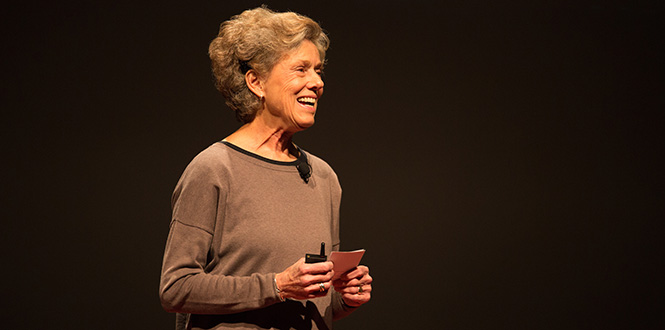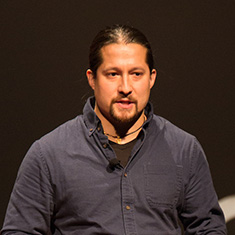TEDxGrinnellCollege shines light on underpublicized topics
Nov. 07, 2018 — During her childhood, Jody Haymond ’67 remembers conversing in sign language with her family while eating out at restaurants in Utah. As the only member of her family who had hearing, Haymond overheard the frequent derogatory statements made by other diners.
“I struggled with others labeling my family as deaf and dumb,” Haymond said. “Then one day a calm came over me. I realize they were that way because they had no experience with deaf people. I can’t change them. Time will increase understanding. I just let go and it never bothered me again.”
 Jody Haymond ’67 presents at TEDxGrinnellCollege.
Jody Haymond ’67 presents at TEDxGrinnellCollege.
Haymond went on to a distinguished career as an educational specialist working with deaf people and their families. Among other things, she facilitated the beginning of cochlear implant programs.
“Those professional experiences together with growing up have come together confirming this perspective and belief that deaf is just a different reality than hearing,” she said. “It’s not less than. It’s equal to.”
Haymond shared her story during a TED talk at the 2018 Grinnell College TEDx Saturday at Roberts Theater inside the Bucksbaum Center for the Arts. Local, self-organized events are branded TEDx, with the “x” indicating an independently organized TED event. The Donald and Winifred Wilson Center for Innovation & Leadership sponsored the College’s third TEDx.
Students, faculty, staff, and community members heard a series of seven talks from alumni speakers. The theme of the event, “Turn on the Light,” was designed to shed light on topics and ideas that don’t always take center stage.
 Kenji Yoshino ’11
Kenji Yoshino ’11
Right off the bat, Kenji Yoshino ’11 expressed the theme with his talk title “Defining Success and Not Caring What Other People Think.” Yoshino created a smartphone microscope that transformed any smartphone into a digital microscope using only $10 of materials from a hardware store. While he could have attempted to patent and sell this as a product, he instead released the plans for anyone to freely use.
“Success in business tends to be about money and not impact,” Yoshino says. “But I’ve redefined what success means to me.”
Yoshino presented six tips on how he made the transformation, starting with disappointing people that care about you the most and finding your passions. While his parents envisioned Yoshino becoming a professor, he developed a love for theater and wood and metalworking.
“I’ve found the fear of letting people down is far worse than the action of doing it,” he told the audience. “My challenge was how to combine science and arts into a career. While doing a fifth-year technical internship, I began teaching sciences to kids at the local library. Think Bill Nye but with more explosions. It was partly theater and required creativity. At night, I was exercising my mind by tinkering with the microscope.”
Yoshino started a small business working with schools to incorporate the smartphone microscope into K-12 science lessons. He joined an entrepreneurism incubator, received a state grant, and formed his business into Infinite Scope Corp. While the business was developing, Yoshino made sure to ask himself if he wanted to continue down this path.
“It still wasn’t about growing to make profits. I just wanted to share an idea,” he said. “In two weeks, Eureka, an open-source 3D printable digital microscope will be released. People can make it on their own for free. Many fully expect us to fail by giving this way. But anytime someone downloads the plans, the business will be a complete success. You all have a choice. Chase approval of others or chase your dream and find success on our terms. Go ahead, disappoint someone.”
Other alumni speakers and topics were:
- Béalleka ’95, “Radical Empathy Disrupts Entitlement”
- Lucinda Ellert ’76, “Growing New Roots: Exploring an Authentic American Orchestral Repertoire”
- Jen Jacobsen ’95, “Three Little Words”
- Adam Lange ’11, “Think Like a Lawyer”
- Sam Offenberg ’14, “When School is the Only Safe Place.”
Robert Ludwig, Wilson Center program coordinator and a TEDx licensee who co-organized the event with Megan Tcheng ’19, said the alums did a great job shedding the spotlight on underappreciated topics.
“We had a great array of speakers, and I think students took home some materials that will help them think about their future endeavors,” he said.
The event was largely put on by a team of students and a few recent alumni who did everything from being master of ceremonies and operating cameras, to designing the set and inviting the speakers.
“The students did a wonderful job and were the lynchpin to the success of the event,” Ludwig said. “Of course we could not have pulled this off without the help from our speaker coach, Kathy Clemons ’95.”
—by Jeremy Shapiro
For your information:
For further information about the alumni speakers and event particulars, visit Grinnell College’s TEDx website. Videos of the speakers will be added to the site in the future.
About TEDx, x = independently organized event
In the spirit of ideas worth spreading, TEDx is a program of local, self-organized events that bring people together to share a TED-like experience. At a TEDx event, TED Talks video and live speakers combine to spark deep discussion and connection in a small group. These local, self-organized events are branded TEDx, where x = independently organized TED event. The TED Conference provides general guidance for the TEDx program, but individual TEDx events are self-organized. (Subject to certain rules and regulations.)
About TED
TED is a nonprofit organization devoted to Ideas Worth Spreading, usually in the form of short, powerful talks (18 minutes or fewer) delivered by today's leading thinkers and doers. Many of these talks are given at TED's annual conference in Vancouver, British Columbia, and made available, free, on TED.com. TED speakers have included Bill Gates, Jane Goodall, Elizabeth Gilbert, Sir Richard Branson, Monica Lewinsky, Philippe Starck, Ngozi Okonjo-Iweala,Sal Khan and Daniel Kahneman.
TED's open and free initiatives for spreading ideas include TED.com, where new TED Talk videos are posted daily; the Open Translation Project, which provides subtitles and interactive transcripts as well as translations from thousands of volunteers worldwide; the educational initiative TED-Ed; the annual million-dollar TED Prize, which funds exceptional individuals with a "wish," or idea, to create change in the world; TEDx, which provides licenses to thousands of individuals and groups who host local, self-organized TED-style events around the world; and the TED Fellows program, which selects innovators from around the globe to amplify the impact of their remarkable projects and activities.
To read more alumni news, check out our news archive.